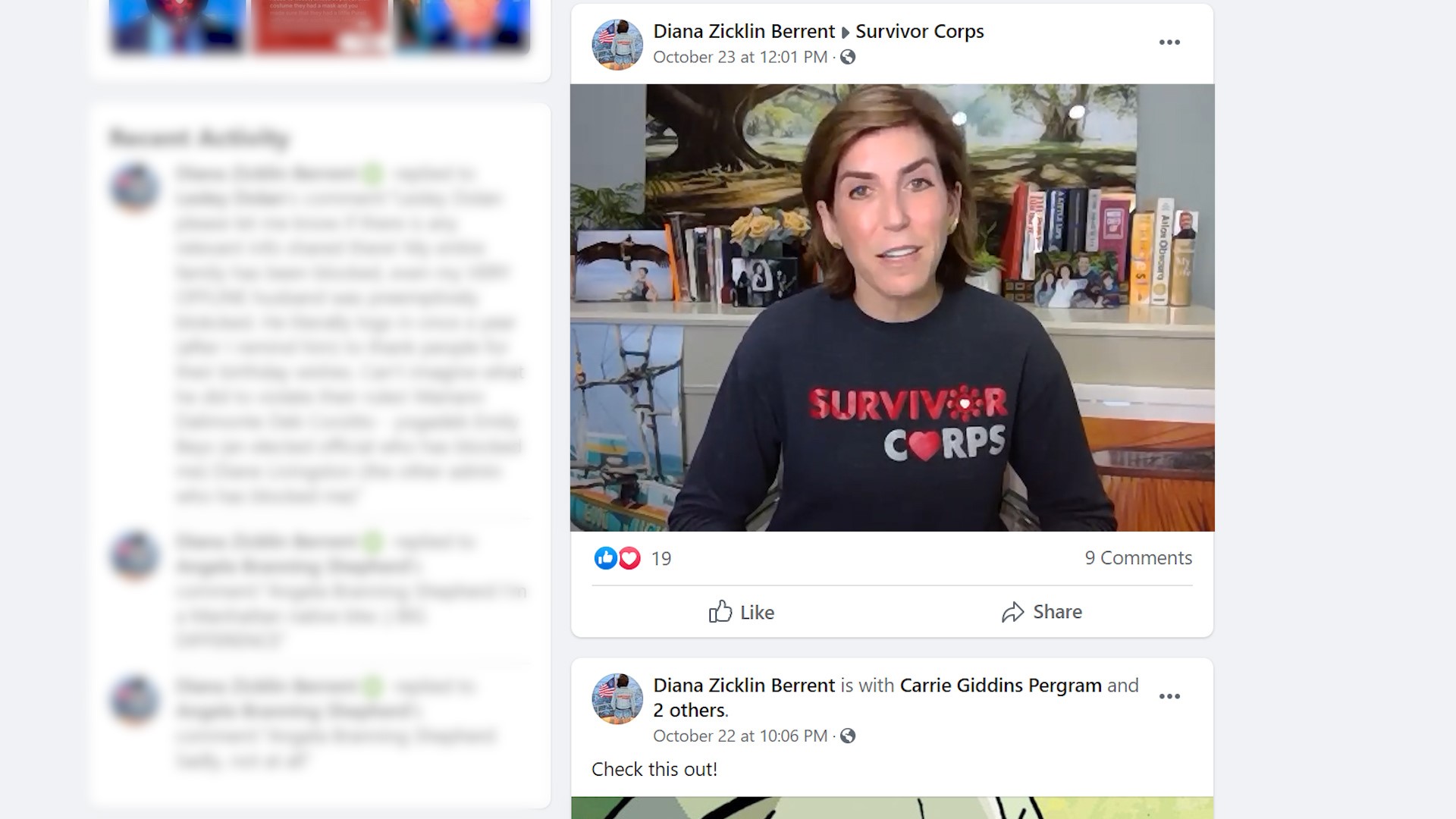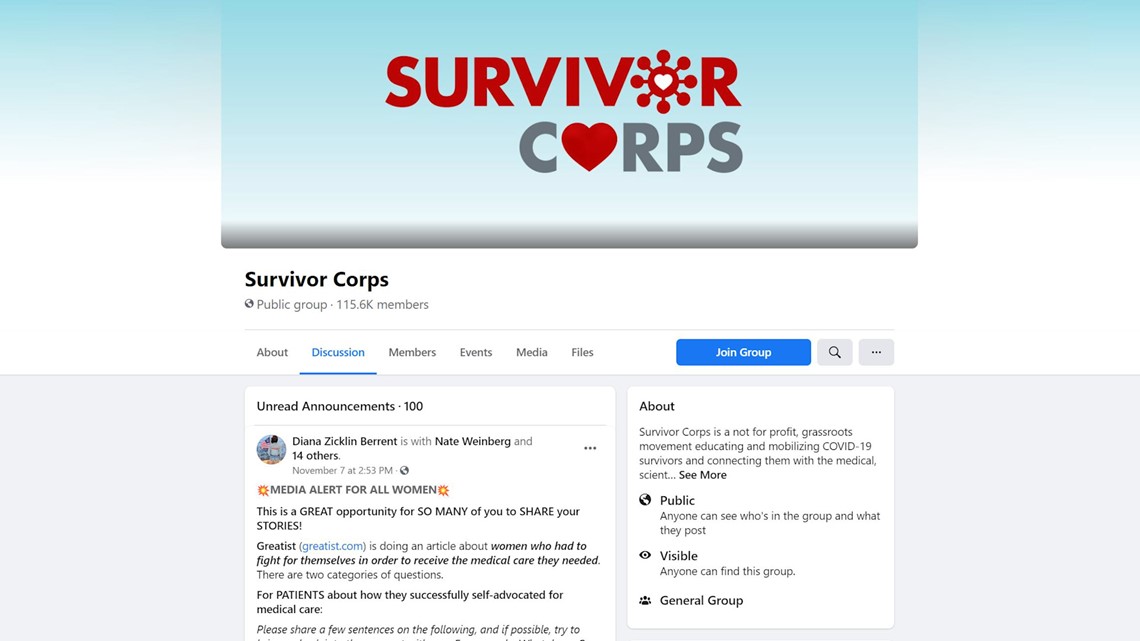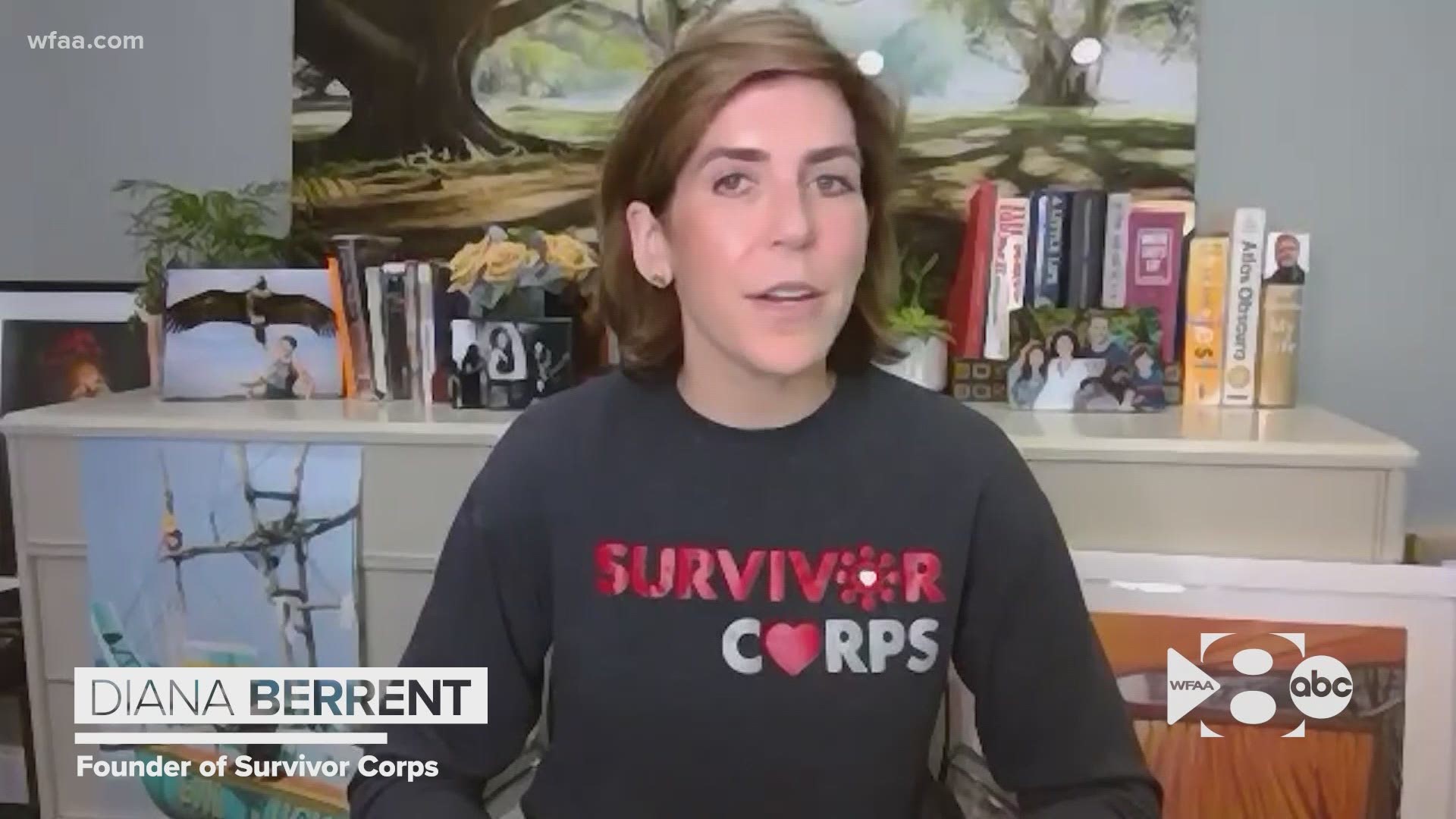Brain fog, hair loss, heart damage: Meet the long haulers who suffer from COVID-19 for months, lack treatment options
About 10% of people who become sick from the novel coronavirus suffer long-term symptoms, a study found. This is a look at their fight for recognition and treatment.

Much of the science around COVID-19 remains to be discovered, and one of its greatest mysteries is how those infected can suffer often debilitating symptoms for weeks and months.
The long-term battle can include a wide range of problems from hair loss to constant fatigue, breathing problems, memory lapses, sudden heart rate changes, and more.
As the virus first swept the country, the issues were ignored and dismissed by the doctors, friends and families of those suffering.
Now survivors are working to support and guide each other, and bring awareness to an under-reported part of COVID, which likely impacts hundreds of thousands of people across the country.
In the coming days, WFAA will share the stories of people across North Texas who continue to struggle with the virus’s long-term impact and fight to be recognized.
And we’ll share the journey of doctors trying to learn why long-hauling happens.
What are COVID-19 long-haulers? The long-term effects of the coronavirus
Diana Berrent was one of the first.
In early March, when U.S. COVID-19 cases were still in the hundreds or low thousands, Berrent, who lives just outside of New York City, tested positive for the virus.
She quarantined away from her family, posting daily video updates online to share her journey.
“It’s going to be a longer recovery than I had anticipated,” Berrent said one recording.
Days passed and Berrent left quarantine after no longer being infectious, but months later, her coronavirus journey still hasn’t ended.
“The frightening thing is what we are seeing is that people are not recovering,” Berrent said.
Dr. Daniel Griffin is the chief of infectious disease at ProHEALTH New York and has treated more than 1,000 COVID-19 patients including those still battling symptoms.
“It was really in about May when you started to see people say, ‘I'm really not getting better.’ You know, a few weeks and we said, ‘You know that that's fine. You were really sick. Give it some time,’” Griffin said. “But then people started saying it's been some time. It's been a month. It's been two months. It's been three months.”
The long-term symptoms include:
- Constant fatigue
- Body aches
- Hair falling out
- Joint pain
- Shortness of breath
- Difficulty sleeping
- Headaches
- Loss of taste and smell
- Brain fog (memory lapses)
- Heart and lung damage
“There's a lot of people that don't want to believe this is true, but you know, this is one of those things that's true whether or not you want to believe it,” Griffin said. “I worry about the people that have the heart damage, you know, who are having trouble going up a flight of stairs. I wonder what will be the long-term impact? Can those lungs ever heal or is this permanent?”
A CDC survey revealed 35% of people who test positive for COVID-19 and have symptoms aren’t better after two to three weeks and even after they’ve stopped testing positive.
It’s not just older people who are impacted either. The survey found 1 in 5 of 18 to 34 year-olds with no previous chronic health issues were also still not back to normal health more than two weeks after testing positive.
It’s often called "long COVID" and those suffering call themselves "long-haulers."
“We're realizing a lot of patients have a long haul, that COVID is not just like the flu,” Griffin said. “It's not just a few days and then a few percent of people feel crummy.”
It continues to be one of COVID’s biggest mysteries and there are still only theories as to why it happens. Facebook groups for those suffering provide anecdotal information
“The simple answer that physicians never like to go with, but it's the truth, is we don't know,” Griffin said. “We're learning.”
Berrent has continued to see specialists and deals with new medical problems from the virus including issues with vision and reoccurring headaches.
“Let me tell you, this is not a matter of having the flu or ending up on a ventilator,” Berrent said. “There is an extraordinarily large bucket in the middle that you do not want to end up in.”
The true total number of long-haulers, like much of the virus, remains unknown and with still limited awareness, reports of long hauling are sometimes dismissed by doctors.
“As a country, we are tracking infections,” Berrent said. “We're tracking hospitalizations and we're tracking mortality, but 95% of people, if not more, are left to recover at home like I did with Gatorade and Tylenol.”
“We probably have more people still suffering from COVID unable to return to work, unable to return to their daily life the way they used to be than people died of COVID,” Griffin said.
The issue is not just in New York, one of the nation’s early hotspots.
Dealing with symptoms for weeks, even months Even after testing negative, patients still struggle
Ellen DiMarco’s symptoms began in March and haven’t stopped.
“It's been hell pretty much,” she said.
DiMarco woke up with a scratchy throat at the end of the month and noticed she’d lost her sense of taste.
“The next few weeks after that were pure misery, like I couldn't breathe. I couldn't catch my breath,” she said. “I was scared to sleep. I was scared I wasn’t going to wake up.”
Months after testing positive, she continued struggling with hair loss, nausea, brain fog and an occasional inability to swallow.
“I feel like at some point in time this virus is going take my life,” DiMarco said through tears. “It may not be today, and it may not be tomorrow, but I feel like there's going be a long term effect from this. When I say that to others that don't have or didn't have this virus, I get looked at like I'm a leper because they don't understand."
Life in a world locked down has been lonely for everyone but those most alone may the ones whose stories are not often shared, people like DiMarco who are still struggling with symptoms of the virus months later.
In New York, which was hit hard by the virus in the early months, doctors are seeing countless cases similar to DiMarco and often referred to as long-haulers, dealing with symptoms weeks and months after they’ve stopped testing positive.
They are proof that the vision the virus as an infection that kills a fraction of the population but is mild or without any symptoms for the rest is a false notion.
Griffin continues to treat COVID patients and long-haulers.
“We're seeing a consistent pattern in thousands of patients in multiple countries,” Griffins said. “I think at this point the people that don't believe it are people who just don't want to believe it despite the science, despite all the observations.”
DiMarco, who lives in Denton, and others in North Texas want bring awareness to the seriousness of the disease and a part of COVID-19 not often talked about.
Tahlia Dodds is in Fort Worth dealing with hair loss, and doctors told her she had a mild heart attack while fighting for air.
“Mentally, it is the biggest roller coaster I've ever been on,” she said. “Breathing was a lot like, uh, imagine having a Capri Sun straw and having it in your mouth and having it duct taped shut around and was your only means being able to breathe was that straw. That's how I felt for almost a month.”
Kenneth Nading would wake up in the middle of the night in Dallas unable to breathe. His heart was so damaged by the virus, he now calls it a “squeaky toy.”
“That's pretty much what it feels like. I can sometimes actually hear it if it's a real quiet room and it's really going,” Nading said. “This thing hit me like a ton of bricks.”
Long hauling doesn’t just impact those with the most severe symptoms. Kali Fields of Arlington was the only long-hauler WFAA spoke with who was hospitalized after testing positive in late May.
“I cried a great deal,” she said. “I was trying to figure out how, when, where, how did it happen.”
She’s been home for months since her three-week hospital stay. Her hair is falling out so much she’s afraid to brush it. She has such difficulty sleeping she prays for a good night’s sleep. Because of brain fog, she often forgets directions to places she’s been hundreds of times, and she struggles with constant fatigue.
“I'm pushing the cart maybe 3 aisles down and by the time I get to the checkout I have to stop and catch a breath,” she said. “I didn't used to have to do that.”
The physical toll may be secondary to mental battle against disbelief.
For months, long-haulers thought they were the only ones struggling with the lasting impact and were doubted by doctors, family and friends.
“It's very lonely,” DiMarco said. “It's very, very lonely you feel like - and it's not that they don't care. because I know that they care. That is not. They just don't understand it.”
“I felt like it was all in my head,” Dodds said. “I became suicidal at that point because I couldn't answer the questions, and I couldn't get answers.”
Then they found a Facebook group and each other.
Berrent, one of New York’s first COVID-19 cases, founded Survivor Corps, a Facebook group for long-haulers that now has more than 100,000 members.


“They are being gaslit by their doctors who are diagnosing them with anxiety, but they are having actual cardiac issues that need to be seen by a cardiologist,” Berrent said. “We're talking about 25-year-olds who were marathon runners before and they're five months into it, and they can't walk to the corner. They have COVID-onset diabetes, COVID onset-lupus.”
The CDC estimates 35% of people who have COVID-19 symptoms are still sick weeks later. Another study estimated that 10% of those who test positive for SARS-CoV-2, the virus that causes COVID-19, aren’t better after a month. With the US passing 10 million COVID-19 cases, that would put the number of long-haulers above 1 million nationwide.
“After finding that I wasn't the only one, I kind of took that step back and go, ‘Ok now I have a group of people that know what I'm going through,” Dodd said.
“I don't want to say gratifying, because it wasn't gratifying,” DiMarco said. “But it was so reassuring and so comforting that I wasn't losing my mind that I wasn't stupid, and I wasn't crazy that it's really, really happening and I'm not imagining it.”
“In the beginning is actually quite resistant to anyone calling the support group,” Berrent said. “I was like this is not a support group. We are a forward-looking solution-based mission, but the truth is that it has been in many ways because we are living under very, very unusual times.”
The Facebook page hasn’t just provided emotional support. It’s raised awareness.
“I think that these groups have really helped to get this on the radar,” Griffin said.
Griffin says doctors still don’t know why some suffer long-term symptoms and others don’t.
“The current thinking is this is somehow related to some immune dysfunction that is provoked during the acute illness,” he said.
COVID-19 is not a virus where the only score is someone lives or die. Long-haulers are not counted on any dashboard or spreadsheet. They’re likely labeled as ‘recovered’ after two weeks even though they’re anything but back to normal.
“I’d like to know what I can do to convince people to take this more seriously,” Kenneth Nading said.
Tahlia Dodds lost her job because COVID kept her out of work. Kali Fields did too. Ellen DiMarco and her husband are now both unemployed as their medical bills pile up.
“Yeah, we're having to sell the House because clearly we can't afford it,” she said. “I mean this virus has affected every aspect of my life.”
No one knows how long the countless long-haulers will deal with the symptoms and impact of the virus, but through Survivors Corps, they’re now believed instead of doubted, together instead of alone.
“We have to encourage each other that we're going to make it through this,” Fields said.
“People need to know that it's not a one and done for a lot of us,” DiMarco said. “I think the more people realize that this is real. and that it's not all political, and it's not a hoax, that maybe it'll be taken a little more seriously.”
Survivors come together virtually for support Multiple Facebook groups have formed
As awareness around COVID-19 has grown, researchers have performed more and more studies on long-haulers.
One in Italy found that of 143 people hospitalized found 53% reported fatigue and 43% had shortness of breath two months after their symptoms started.
Another found that 87% of people hospitalized with the virus continued to deal with at least one symptom more than two months later.
A third estimated 10% of those who get COVID still have symptoms more than a month later. That would mean more than one million long-haulers nationwide.
For all of the percentages, though, no research has been able to answer the question those suffering seek most: why.
“The frightening thing is what we are seeing is that people are not recovering,” said Berrent.
Berrent’s Facebook group Survivor Corps was one of the first to recognize the long tail of the virus.
“We have been sort of - you could say - the canary in the COVID coal mine,” Berrent said.
Long-hauler Facebook groups have continued to pop up for countless still dealing with debilitating symptoms, such as Long Haul COVID Fighters, Long Covid Support Group, and COVID-19 Longhaulers Discussion Group.
Nading worked out often before getting the virus, but now months later, he’s still dealing with damage to his heart.
“Now any flight of stairs, about a flight and a half, and I'm really breathing,” Nading said. “You don't know how it's going hit, and you don't know whom you're affecting,” he said.
The long-term symptoms affect both the old and young. A Survivors Crops poll on their Facebook page with thousands of responses found the average long-hauler to be a 44-year-old woman.
Across North Texas, WFAA spoke with people are experiencing everything from hair loss and brain fog to breathing and swallowing complications.
“I understand people going, ‘it's just a worse version of the flu. It's not that bad’,” Dodds, a long-hauler in Fort Worth said. “The thing is, I've had the flu. Five months later, I wasn't still suffering from the effects of the flu.”
Science is only beginning to grasp the mysterious lingering illness, but as support groups like Survivor Corps grow, so does awareness among medical professionals.
“Part of what we can do to help them, it's just the education, just saying, ‘Ok, this is what we're seeing. What are you experiencing,’” Dr. Griffin said.
He said while there’s no cure, he’s found aspirin and pain relievers can help make life manageable.
“Now that we’re saying, ‘Why don't you take a Naprosyn or an ibuprofen before bed,’ people are coming in saying, ‘Oh my gosh, that really made a difference’,” he said.
Through telemedicine, local long-haulers are now connecting with doctors across the country.
DiMarco discovered she had seven ribs out of place from coughing, but her health began improving when a new doctor prescribed steroids.
“She immediately wanted testing done, and I have to tell you when I got off the phone with her, I completely lost it, crying hysterically because somebody believes me,” DiMarco said through tears. “She was the first doctor that actually believed me.”
In New York, one of the nation’s early hotspots, centers designed for long-haulers have already sprung up.
“We are going to need post COVID care centers throughout the country,” Berrent said. “We need medical care for these people who are experiencing debilitating, debilitating results of having COVID.”
Long-haulers have faced doubt over their symptoms and even the virus’s existence.
Kali Fields spent 17 days in the hospital in June and still suffers from symptoms.
“When people believe that it's not as serious as it is I just don't say anything because you can't change their mind. You can only tell your testimony in your experience and whether they believe it or not, that's on them,” Fields said. “Nobody can tell me any different. I'm sorry, you can't. I've experienced it for myself and it's horrible experience, horrible.”
“We’ve had the brush with the possibility of not surviving it,” Nading said.
Less than a year ago, the virus was unknown. Now, the solutions for long-haulers are temporary, and the outlook is impossible to predict.
“I don't want anyone to have to go through this,” DiMarco said. “This is not a way to live the way that I'm living right now.”
While the world pushes to stop the spread, doctors and researchers are hoping to find answers and peace for the countless those still suffering.
“There are clinicians who are versed in this,” Dr. Griffin said. “There are clinicians who understand this, and there are clinicians that can be of some help.”
“It’s going to get better,” Field said. “We’re going to get better. This too shall pass.”


